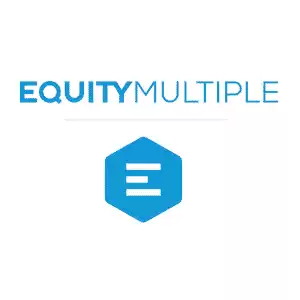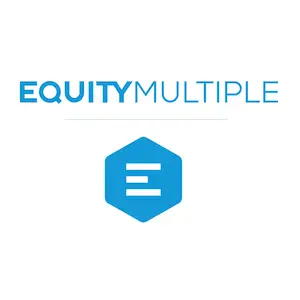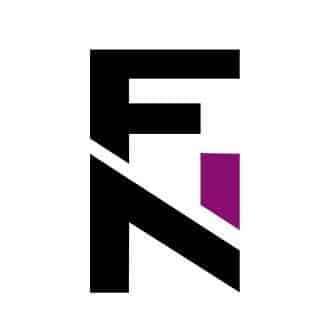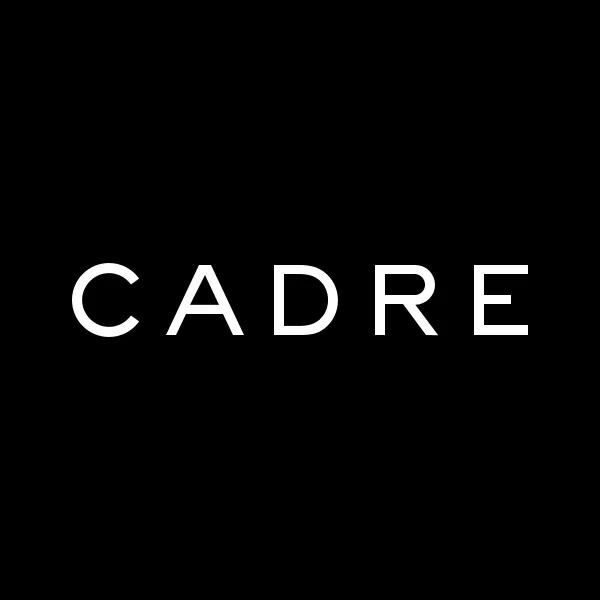An accredited investor has access to some of the best investment options that can help them increase their net worth and get richer. Once they meet requirements , they can access certain accredited investor opportunities that can be highly lucrative.
There are a few investments geared for accredited investors such as crowdfunding, real estate syndication, convertible investments, REITs, venture capital, private equity real estate, interval funds, and hard money loans.
We've already reviewed the best real estate crowdfunding sites for non-accredited investors. Now, we'll go over the best real estate crowdfunding options for accredited investors.
Best Investments for Accredited Investors
Want to build real wealth? Here are our favorite investments for accredited investors:
|
Rating:
5.0
|
Rating:
4.5
|
|
Minimum Investment: $10,000
|
Minimum Investment: $5,000
|
1. Yieldstreet: Best for Accredited Investors
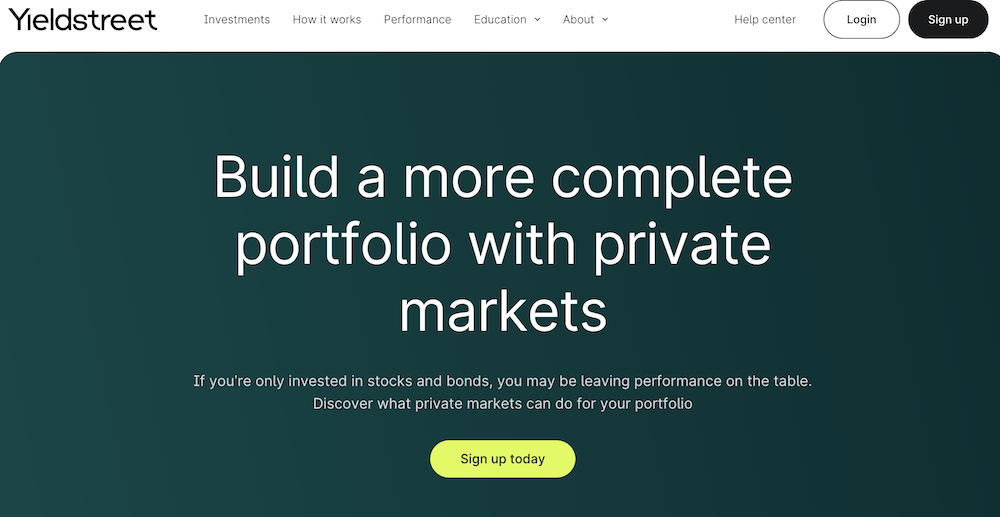
- Best For: YieldStreet is the best option for most accredited investors who are looking to invest passively. Yieldstreet has been in business since 2015 and has a community of over 225,000 members who look to alternative investments as a way to diversify their investment portfolios outside of the stock market. To date, Yieldstreet has returned over $600 million in principal and interest payments to its investors.
- Minimum Investment: $10,000
- Fees: 1% – 2.5% in management fees
- Fund: Access to real estate, commercial, marine, legal and art investments.
Yieldstreet is an alternative investing marketplace that brings private investment opportunities to retail investors that have typically been dominated by hedge funds and the ultra-wealthy. There is no other platform that lets you invest in real estate, art, legal finance, and more — that is until Yieldstreet.
Yieldstreet, unlike other crowdfunded real estate platforms, funds the crowdfunding incurred to finance those projects — as well as a number of other deals.
Yieldstreet is a marketplace where individuals can invest in private structured credit deals, which are typically inaccessible to retail investors.
Although most transactions are limited to accredited investors, Yieldstreet launched the Yieldstreet Alternative Income Fund, which is accessible to nonaccredited investors with a $10,000 minimum investment.
As of January 2024, $3.9 billion had been invested on the platform. Yieldstreet was placed 46th on the 2020 Inc. 5000, a list of the fastest-growing privately held businesses in the United States.
Pros
- One of the best options for accredited investors.
- Variety of investment options such as real estate, commercial, marine, legal and art financing deals.
- Fees can be low for certain projects.
- Nonaccredited investors can participate in the Yieldstreet Alternative Income Fund.
Cons
- Highly illiquid investments.
- Most investments are open only to accredited investors.
Yieldstreet is an alternative investment platform that connects you to income-generating investments that traditionally have been reserved for institutions and the ultra-wealthy.
These alternative investment opportunities are typically backed by collateral, and span across various asset classes such as art finance, real estate, commercial finance, legal finance, and more. These asset classes have been known to generate returns for decades, but have typically been closed off to retail investors.
Simply click here to signup and get started.
Traditional investments that were reserved for the ultra-wealthy are now available to you. Wealth professionals recommend allocating 15-20% of your portfolio to alternatives. Diversify your portfolio and earn passive income with investments starting at $10,000.
2. EquityMultiple: Best for Investment Variety
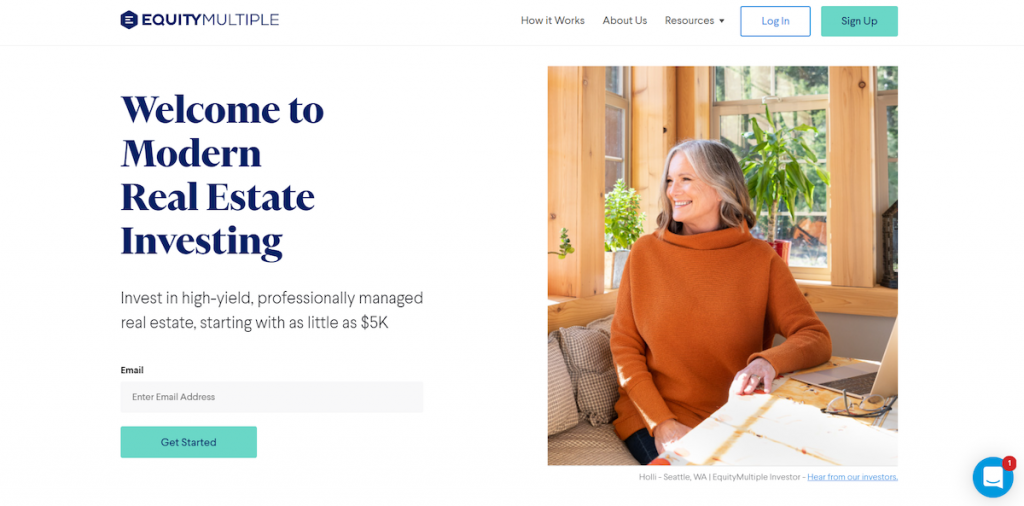
- Best For: EquityMultiple is best for accredited investors who want a variety of real estate investment options and lower minimum investments than similar platforms.
- Minimum Investment: $5,000 for short-term loans and $10,000 or more for equity-based investments
- Fees: Typically 0.50% to 1.5%
- Fund: Variety of investment options, including debt, preferred equity, and opportunity funds,
EquityMultiple states it makes investing in real estate “simple, accessible, and transparent” for accredited investors. And, with a $5,000 investment minimum and a variety of ways to build your portfolio, this claim is quite fair.
You have three options to invest with EquityMultiple:
- Direct Investing: Invest in single properties with as low as $10,000 with target durations of six months to five years.
- Fund Investing: Invest in multiple assets for increased diversification. The EquityMultiple fund requires a minimum investment of $20,000 and has a target duration of 1.5 to 10+ years.
- Savings Alternative: Invest in diversified notes with as low as $5,000 with target durations of three to nine months.
Fees vary depending on your investment type. Equity investments usually charge 0.5% to 1.5% while debt investments charge 1% or less.
Funds have varying origination fees and annual administrative expenses, but this is still normally under 2% in annual fees.
Pros
- Variety of investment options.
- Low fees.
- Variety of investment properties.
Cons
- Equity-based projects have higher minimum investment requirements.
- Fees vary and are somewhat confusing to understand.
Overall, EquityMultiple has more variety than most Fundrise alternatives. Equity, debt, funds, and 1031 Exchanges are all available, and properties range from townhouses to commercial office spaces.
- Invest in vetted opportunities across debt, equity, and preferred equity
- Get started with just $5,000 to diversify your portfolio
- Every deal is carefully analyzed to reduce risk
- Easily monitor performance through an intuitive dashboard
- Equity investments offer the highest upside
3. First National Realty Partners: Best for Grocery-Anchored Real Estate Investing
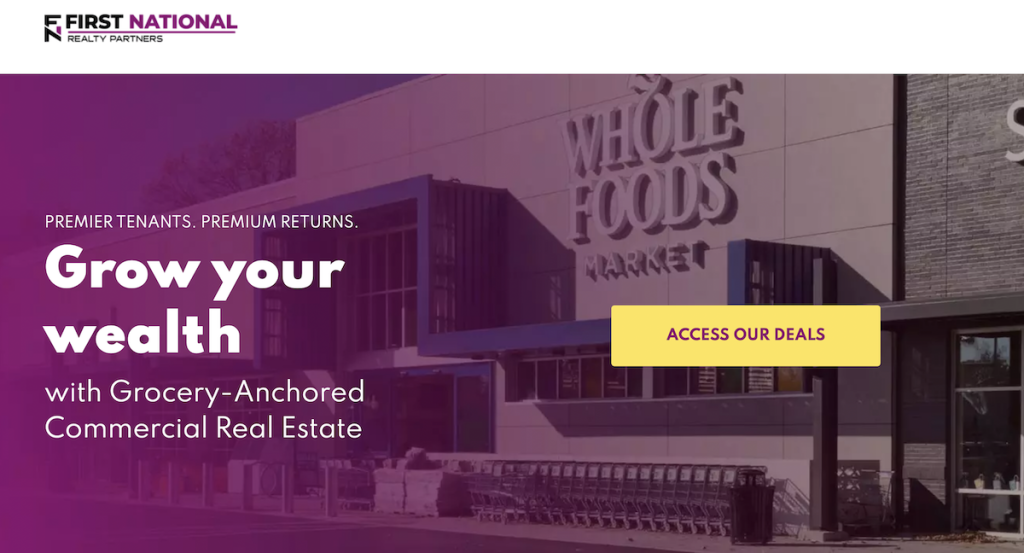
- Best For: First National Realty Partners is an ideal choice for everyday accredited investors who are looking for institutional-quality investments that achieve exceptional, risk-adjusted returns. FNRP comes in at a high minimum investment, but for the quality of investments they offer, this is one of the best ways to diversify your portfolio into commercial real estate.
- Minimum Investment: $50,000 for most marketplace listings
- Fees: 0.5-1.5%+ annual asset management fee
- Fund: Individual deals and opportunity fund
First National Realty Partners is a real estate crowdfunding sponsor that specializes in grocery-anchored retail properties. This means that they offer commercial real estate investments in retail shopping centers, anchored by essential needs tenants.
With FNRP, you can invest in institutional-quality commercial real estate investment opportunities both on and off-market.
By leveraging their relationships with top-tier national brand tenants, they compete directly against these institutions to provide you with deals that achieve those superior passive returns.
The process is simple, once you sign up and find a deal you love, you attend a webinar to learn more about it. You can then make your investment through a 100% secure digital process and then sit back and enjoy your quarterly distributions.
Pros
- Strong due diligence process
- Institutional quality investments
- Easy process to get started
Cons
- High minimum investment amount
FNRP is the nation’s premier crowdfunding sponsor of grocery-anchored commercial real estate. FNRP is a smart option for accredited investors looking to earn superior risk-adjusted returns in the necessity-based retail space.
4. FarmTogether: Diversifying Your Portfolio With Farmland
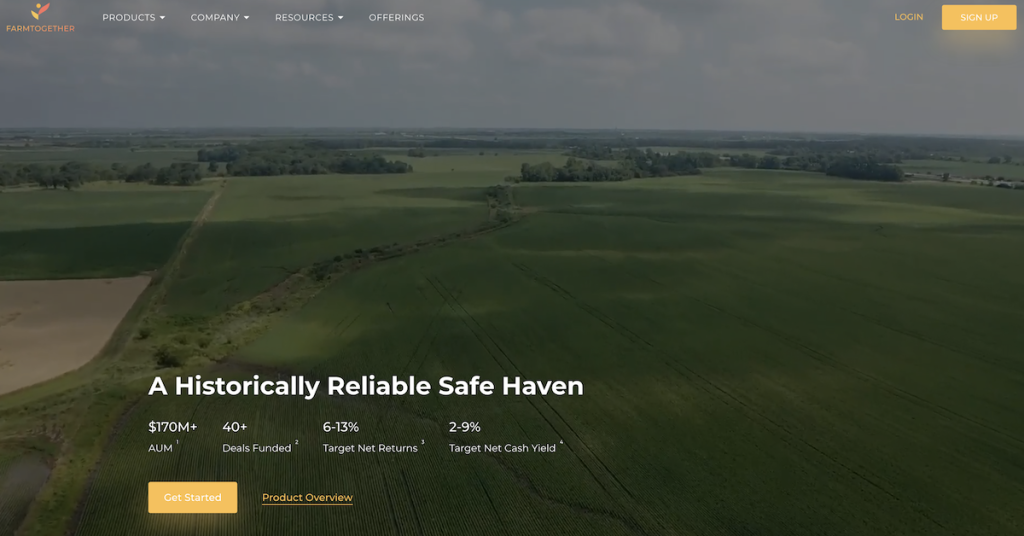
- Best For: Farmland is designed to be a longer-term investment, which is why you will see typical hold periods of 8-12 years for FarmTogether’s crowdfunded and bespoke deals.
- Minimum Investment: $15,000
- Fees: 1.00% – 2.00%
- Fund: Invest in U.S. farmland
Most accredited investments let you invest in commercial real estate, rental properties, or debt. In contrast, FarmTogether lets accredited investors take advantage of U.S. farmland.
While many investors are familiar with the benefits of adding alternative investments like commercial or residential real estate to their portfolios, few are equally familiar with farmland.
Farmland is a real estate investment that has historically offered high, inflation-linked returns, low volatility, a lack of correlation with most asset classes, and an opportunity to drive sustainable solutions for the planet.
FarmTogether typically targets net IRRs of 6-13% with target net cash yields ranging from 2-9%, both net of fees.
At the end of the hold period, the property is often sold and investors can receive the appreciated value of the farm, assuming the land rose in value.
In general, permanent crops are held for longer than row crops because they take longer to mature.
Pros
- Multiple ways of investing in farmland opportunities, including crowdfunded offerings, bespoke properties, and their Sustainable Farmland Fund
- Investments target net IRRS of 6-13% and net cash yields of 2-9%, both net of fees.
Cons
- Minimum investment of $15,000
- Less liquid than traditional investments
Anyone can open a free account with FarmTogether to explore the platform.
After answering some basic questions, including whether or not you qualify as an accredited investor, you will be able to view the company’s investment products, including any live crowdfunding deals.
FarmTogether's crowdfunding platform is one of the few ways accredited investors can get exposure to farmland as an asset class. With decent returns and low fees, it is a compelling choice for those looking to diversify their portfolios. The minimum investment amount is $15,000.
5. Cadre: Best Real Estate Investing Option for Liquidity
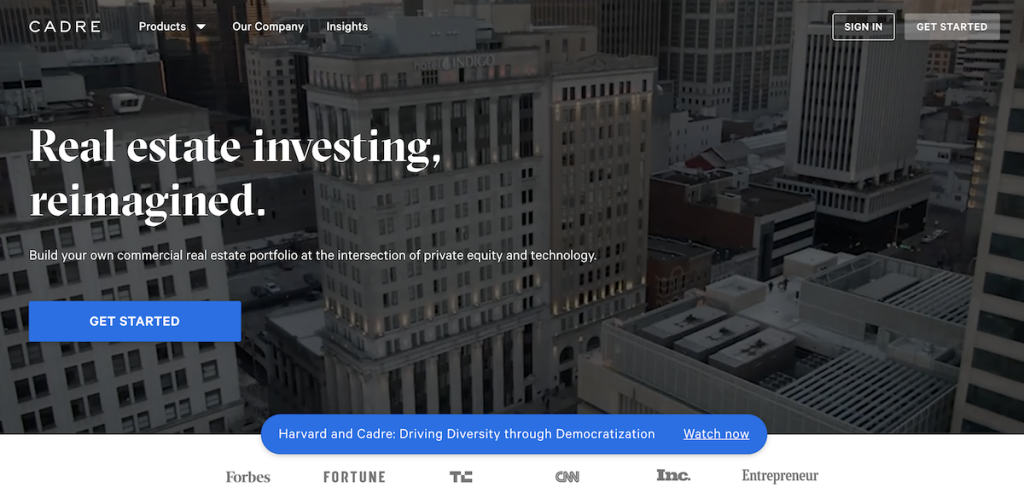
- Minimum Investment: $25,000
- Fees: 1% of your gross invested dollars upfront per transaction and a 1.5% of net asset value recurring annual management fee.
- Fund: Access Fund
Cadre offers real estate investment opportunities for accredited investors. They have a high 18.2% historical rate of return and it is a great option for investors who want to diversify with real estate.
Over the past six years, Cadre has developed an innovative platform that gives you direct access to highly curated commercial real estate investments alongside some of the largest financial institutions in the world.
Cadre members benefit from its rigorous technology-driven, experience-led investment selection process with greater transparency and low fees.
Pros
- Every transaction, from the company's leaders and employees to investors, Cadre stakeholders, and even contractors, is aligned with one another.
- Cadre's compensation is primarily based on long-term contract success, not the volume of transactions conducted on its platform.
- Its secondary market has the potential for liquidity.
Cons
- There are no non-accredited investment opportunities.
- A high $25,000 minimum investment is required.
- There are no real estate investment trusts or other highly diversified funds offered by Cadre.
- Not a lot of deal flow, only about one new deal every month, which means you may miss out on an excellent real estate investment opportunity.
Cadre offers accredited investors direct access to institutional-quality assets. The minimum investment of $25,000 is among the greatest of real estate platforms, although the historical return of 18.2% per year is also high. Cadre is a good fit for high-net-worth investors who want their money to make them money.
Real Estate Investing FAQs
Real estate crowdfunding uses funds from a group of investors to help fund real estate investments.
This could mean using funds to purchase properties in opportunity zones, develop existing properties into higher-value assets, or to provide loans for real estate development.
Real estate crowdfunding is different than traditional real estate investing. There are four main ways to make money with real estate crowdfunding:
Capital Appreciation: This occurs when you own shares in real estate and the property appreciates.
Rental Income: Many real estate crowdfunding platforms invest in single-family rental properties or commercial real estate to generate rental income.
Dividend Payments: Some crowdfunding sites pay annual or quarterly dividends to shareholders.
Interest Payments: If you fund real estate loans, you earn interest as the borrower pays off their loan.
Picking the best real estate crowdfunding platform depends on your goals, starting capital, and risk tolerance. Yieldstreet is the best platform overall for investing for accredited investors.
What is an Accredited Investor?
Let's start by determining what an “accredited investor” is.
The majority of these internet real estate investment opportunities are only available to accredited investors.
The SEC and FINRA are two massive regulatory bodies that screen investments available. These agencies' mission is to safeguard average investors. The trouble is that these institutions are unable to review each and every investment opportunity accessible.
Some investment opportunities, in place of this rule, are only available to qualified investors. Because these investments are unsupervised, they anticipate that the individual investor will conduct their own research.
These investors have a higher income or greater net worth than most retail investors. These regulatory agencies recognize that this sort of investor has a stronger risk tolerance, implying that they can participate in these unregulated investments with greater safety.
Don't worry! The vast majority of these high-yield investments for accredited investors are entirely legitimate — we've done the vetting for you.
It's just important for you to find an option that fits your long-term investing strategy.
Income/Net Worth Requirements
To be an accredited investor, you must fulfill one of the following conditions:
- Your yearly income must be $200,000 or more for single filers or $300,000 for married couples.
- You must have a net worth of at least $1 million, excluding the value of your primary residence.
However, if you fulfill either of these conditions, you are deemed an accredited investor. That means you may invest in both accredited and non-accredited investment opportunities like using Fundrise alternatives.
If you meet these requirements, there are the best investments for accredited investors.
The Bottom Line: Greater Rewards Can Come With Greater Risks
Accredited investors have access to a wider range of potential investment possibilities than those with less ready access to money. While capable of delivering greater profits than traditional investments, many of these opportunities also carry more risk.
If you'd like to try a more aggressive investment approach with the potential for greater returns, these real estate crowdfunding investments are the best for accredited investors. Readers who wish to diversify their portfolios may look into other real estate opportunities in addition to this.
In summary, we recommend using Yieldstreet as it is the best option, with the best track record, for both accredited investors and nonaccredited investors alike. And your money deserves high target yields, at Yieldstreet.
Traditional investments that were reserved for the ultra-wealthy are now available to you. Wealth professionals recommend allocating 15-20% of your portfolio to alternatives. Diversify your portfolio and earn passive income with investments starting at $10,000.



